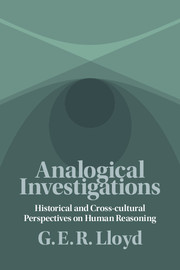Book contents
- Frontmatter
- Contents
- List of diagrams
- Introduction
- 1 On the very possibility of mutual intelligibility
- 2 The multiple valences of comparatism
- 3 Analogies, images and models in ethics: some first-order and second-order observations on their use and evaluation in ancient Greece and China
- 4 Analogies as heuristic
- 5 Ontologies revisited
- 6 Conclusions
- Glossary of Chinese terms
- Notes on editions
- Bibliography
- Index
4 - Analogies as heuristic
Published online by Cambridge University Press: 05 September 2015
- Frontmatter
- Contents
- List of diagrams
- Introduction
- 1 On the very possibility of mutual intelligibility
- 2 The multiple valences of comparatism
- 3 Analogies, images and models in ethics: some first-order and second-order observations on their use and evaluation in ancient Greece and China
- 4 Analogies as heuristic
- 5 Ontologies revisited
- 6 Conclusions
- Glossary of Chinese terms
- Notes on editions
- Bibliography
- Index
Summary
Oportet enim nobis servire voces Geometricas analogiae; plurimum namque amo analogias, fidelissimos meos magistros, omnium naturae arcanorum conscios: in Geometria praecipue suspiciendos, dum infinitos casus interiectos intra sua extrema, mediumque, quantumvis absurdis locutionibus concludunt, totamque rei alicuius essentiam luculenter ponunt ob oculos.
(For us geometrical terms ought to obey analogy. For I love more than anything the analogies, my most trustworthy masters. They are aware of all the secrets of nature. In geometry especially they ought to be esteemed, for despite the incongruous terminology they resolve an infinity of cases between their extremes and the mean, and they place the whole essence of any subject vividly before the eyes.)
Kepler (1968 [1604]: ch. 4, 95)My discussion of analogies in Greek and Chinese ethics has already brought to light first just how extensively they were used, secondly how warnings about their deceptiveness can be found in both Greek and Chinese writers, and thirdly that exceptionally, in Greece, Aristotle attempted an analysis of analogical argument explaining under what conditions it can be considered valid, namely where there is a complete induction of all the particular cases falling under a genus. That sets the agenda for this chapter where I focus on heuristics. There are some authoritative analyses of the use of analogies and models in modern science, notably the classic essay by Hesse on their role in the development of thermodynamics (Hesse 1963). One particularly fruitful area for the exploration of analogies has been the use of computers to model complex cognitive processes, where the strengths of the positive analogies have been such as to make problematic the question of whether we are dealing with ‘mere’ analogies. Does the computer have a mind, or does it just behave in ways that resemble one – the issue at the heart of controversies over Artificial Intelligence (e.g. Searle 1984, Haugeland 1985, Crane 1995), where the role of analogy in computational reasoning has been much studied (e.g. Kedar-Cabelli 1988, Burstein 1988, Holyoak and Thagard 1989)? Here, however, the chief topic I shall address relates to the ancient antecedents of the heuristic role or roles of analogies. One of my strategic aims, in these studies, is to examine the strengths and weaknesses of recurrent Western methodological preoccupations, in particular the insistence, in certain contexts at least, on strict deductive demonstration. Accordingly I shall, in this chapter, pay special attention to both the positive and the negative evaluations of analogy in heuristics that we find not just in ancient Greece, but also in ancient China and further afield.
Let me first outline the structure of my discussion. The first section will concentrate on mathematics and consider how the apprehension of similarities and the appeal to perceptible diagrams figure in a variety of contexts, and serve different purposes, in both China and Greece. One of the principal aims of early Chinese mathematics, at least to judge from remarks in Liu Hui in the third century ce, is to establish the common features that link different members of the same class of mathematical objects and, further, to develop procedures that can be applied to different fields of mathematical studies, allowing the subject to grow by extrapolation. Liu Hui considers this to be research into the guiding principles of mathematics and he expresses no reservations on the matter.
- Type
- Chapter
- Information
- Analogical InvestigationsHistorical and Cross-Cultural Perspectives on Human Reasoning, pp. 58 - 87Publisher: Cambridge University PressPrint publication year: 2015



